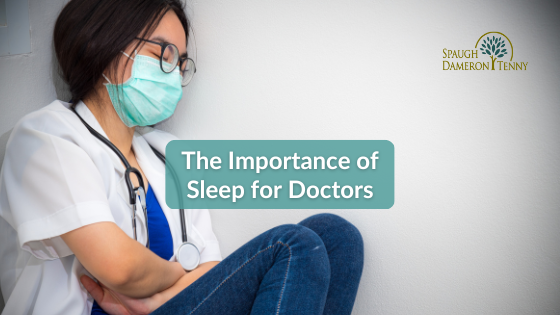Sleep is essential for a healthy body, mind, and spirit, allowing the body to recharge and restore itself. Good sleep can help your body remain healthy and prevent diseases. Without quality sleep, your health can affect your brain’s ability to function properly.

The American Academy of Sleep Medicine (AASM) performed a survey before the COVID-19 pandemic to see how Americans prioritized sleep. Believe it or not, sleep came up in the #2 spot, second only to family. Unfortunately, however, as a nation, we don’t act like sleep is number two. Instead, we are watching shows on streaming platforms, scrolling on social media, and not making sleep a priority as we used to before there were so many options competing for our time.
We know that sleep is essential for health and longevity. And a lack of sleep can cause a variety of illnesses. There are some specific categories where sleep has a profound impact, including:
For example, certain amino acids and hormones are released during sleep, which helps with muscle soreness and growth.
There is a system called the glymphatic system, which is a waste clearance system in the brain that basically eliminates proteins and metabolites that are produced as we function and live our daily life.
If you study something and then go to sleep, you are much more likely to remember it the next day versus pulling an all-nighter that is sometimes popular in college or medical school.
For instance, if you enjoy a good night’s sleep and then get a vaccination the next day, there is evidence of a more robust immune response.
Not getting enough sleep can impair your brain’s function, impairing your ability to concentrate, think clearly, and process memories.
It can make us more empathetic, helping us better understand our partners, coworkers (other doctors, clinicians, and support staff), and our patients.
Overall, sleep is not just necessary for life, but more importantly, to live well!
The AASM generally recommends that adults aim for at least seven hours of sleep each night. There is a little variation, but most people need between seven and nine hours of sleep nightly. To be sure, four to five hours is very little sleep and probably not enough for most, including medical residents, to function well.
Consistently getting around seven hours of uninterrupted sleep is the aim. Humans do best with routines of some sort. If you can keep a regular sleep cycle, it is helpful. Everyone has a built-in circadian rhythm, a biological clock that dictates when it is best to sleep and eat and when our energy levels are highest, so keeping a pattern around those things is best if you can do it.
Sleep deprivation can be sorted into partial sleep deprivation, chronic deprivation, and then total sleep deprivation. The early signs of sleep deprivation typically have to do more with mood and memory. As a result, people tend to be more irritable and shorter with the people around them. It can also affect interpersonal skills and the ability to be empathic towards others.
As sleep deprivation continues, it can affect your health. It can cause issues with memory and accuracy and the ability to complete tasks with speed. And eventually, it seems to impact your metabolism. There is an increased rate of obesity in those who do not sleep well or cannot sleep enough. Problems can develop with heart disease, cardiovascular disease, and cerebrovascular disease. In addition, lack of sleep seems to cause some inflammation or inflammatory response. You can see it as a spectrum, from the very mild to something that can be pretty significant.
Those in healthcare don’t tend to prioritize their sleep. Ironically, physicians and other clinicians talk about lifestyle modifications, including getting more or better sleep, for our patients, but then we don’t take care of ourselves. It is vital to remember that doctors are not superhuman and cannot get aware with no sleep or less sleep than everyone else needs.
Sleep is one of those things; the more you force it, the harder it is to get it. So physicians, dentists, and other healthcare professionals should use common sense when it comes to sleep—perhaps considering their current sleep and lifestyle habits that may be making it more challenging to get the quality sleep they need and want. Below are some easy changes you can implement in your nighttime routine to see if they make a difference in your sleep.
Make sure you stick to it everyone evening, even on the weekend. If you do shift work or work seven days on and then seven nights on, you will have to figure out how that works best for you.
If you have to work evening hours, make sure that you finish working at a reasonable time so that you can turn the electronics off and start your wind-down routine before you feel rushed to do so.
Is your bedroom conducive to promoting sleep? First, check to ensure the room is cool, dark, and quiet. Although some may consider this cold, the best sleep temperature is between 65 – 70 degrees.
Try adding soft sheets and maybe even a weighted balance. Both can help you feel snuggly. Make sure your mattress and pillow are giving you the support you need.
There is no shortage of apps and devices available to track your sleep. However, tracking your sleep is a double-edged sword. Sometimes it is beneficial for people to measure your sleep to determine what is going on, but others may take it to the extreme. And instead of it helping, the information can make you question whether or not you are getting good quality sleep.
Tweaking your exposure to light can help. In the morning, being exposed to sunlight is beneficial. However, you want to minimize your exposure in the evening and at nighttime. Again, some of this comes from electronics, but ensuring you have the appropriate window treatments and light dimmers can also help.
Any substance you ingest before sleep needs to be carefully evaluated. For example, some folks think a little nightcap beverage will help them fall asleep. And in some cases, it can be relaxing and help your fall asleep. But then it turns out that as the alcohol is metabolized, the rest of the night tends to be more disruptive. As a result, you may experience more nighttime awakenings and worse sleep quality. Similarly, eating or taking certain medications too close to bedtime can also disrupt your sleep.
Everyone has a bad night from time to time, and we get over it and are perfectly fine. However, someone who has chronic insomnia has trouble falling asleep or staying asleep for more than three nights a week for three months. If this describes you, it is time to reach out to a professional. In addition, if you are feeling very sleepy during the day and having difficulty focusing at work, get some help.
There are a lot of great websites. However, I usually recommend the Sleep Education site of the American Academy of Sleep Medicine. This site has a wealth of information.
Another key resource is your primary care provider. Talk to them and let them know what you are experiencing.
We are grateful to Dr. Fariha Abbasi-Feinberg for sharing her knowledge and expertise and partnering with Spaugh Dameron Tenny. In addition to authoring this blog, she recently appeared on our podcast – Breaking Down the Value of Sleep – where she discussed how sleep impacts health and memory and how COVID has affected our country’s sleep habits.
If your finances or financial stress is interfering with your sleep, please don’t hesitate to connect with one of our advisors at Spaugh Dameron Tenny. We understand that every individual comes with their own financial background, roadblocks, and needs. That is why we work with you to help you eliminate financial worry and strengthen the foundation from which you build your life and profession.
CRN202506-2630712

Fariha Abbasi-Feinberg MD, FAASM, FAAN is a Board-certified Sleep Medicine Physician and serves on the Board of Directors for the American Academy of Sleep Medicine. She practiced in NC for 20 years but recently Dr. Abbasi relocated to Ft. Myers FL. She is the Medical Director of Sleep Medicine for Millennium Physician Group.
She has been interviewed for numerous publications including the Wall Street Journal, The New York Times, Newsweek, and U.S. World Report. She has been named as Top Doc in Charlotte in the past and now in Southwest Florida as well.